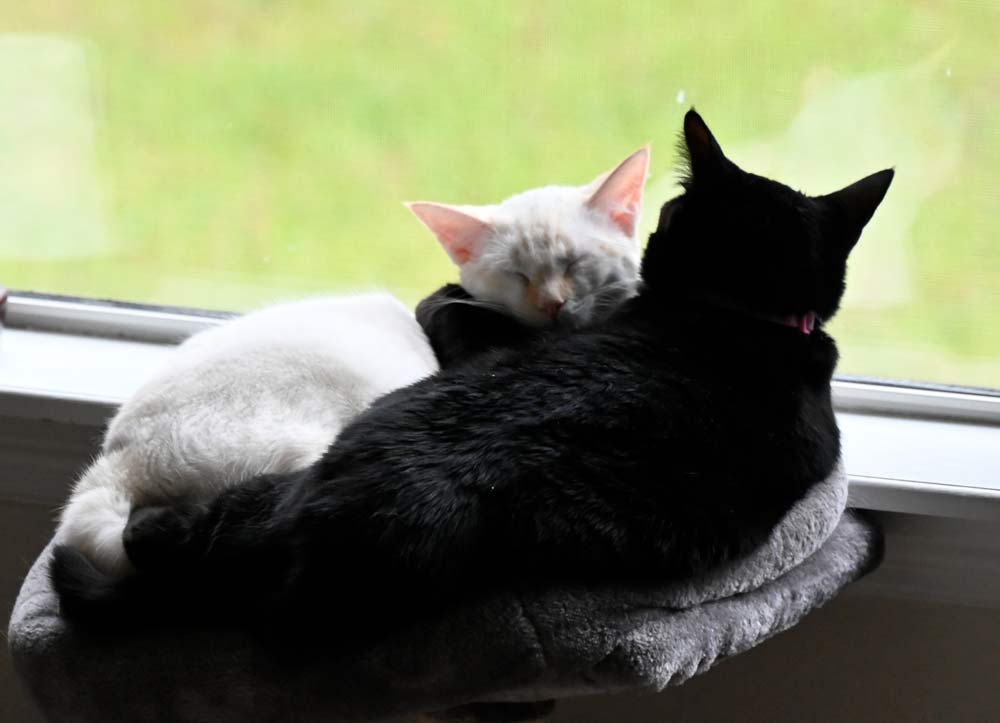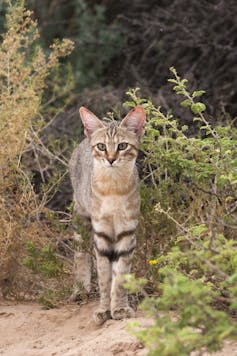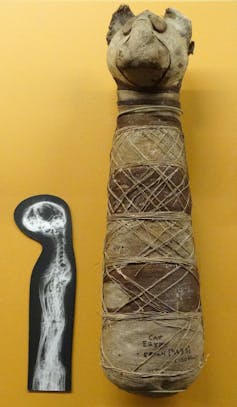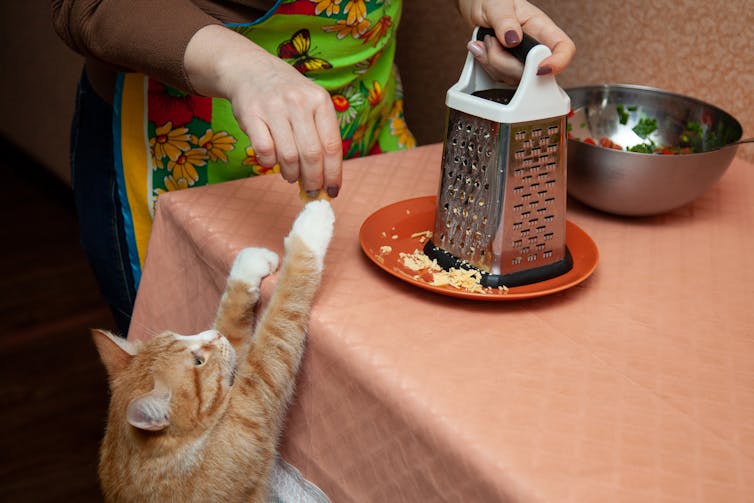
By Jonathan Losos
A few years ago, I had the opportunity to go on safari in southern Africa. One of the greatest thrills was going out at night looking for predators on the prowl: lions, leopards, hyenas.
As we drove through the darkness, though, our spotlight occasionally lit up a smaller hunter – a slender, tawny feline, faintly spotted or striped. The glare would catch the small cat for a moment before it darted back into the shadows.

pum_eva/iStock via Getty Images Plus
Based on its size and appearance, I initially presumed it was someone’s pet inexplicably out in the bush. But further scrutiny revealed distinctive features: legs slightly longer than those of most domestic cats, and a striking black-tipped tail. Still, if you saw one from your kitchen window, your first thought would be “Look at that beautiful cat in the backyard,” not “How’d that African wildcat get to New Jersey?”
As an evolutionary biologist, I’ve spent my career studying how species adapt to their environment. My research has been reptile-focused, investigating the workings of natural selection on lizards.
Yet, I’ve always loved and been fascinated by felines, ever since we adopted a shelter cat when I was 5 years old. And the more I’ve thought about those African wildcats, the more I’ve marveled at their evolutionary success. The species’ claim to fame is simple: The African wildcat is the ancestor of our beloved household pets. And despite changing very little, their descendants have become among the world’s two most popular companion animals. (Numbers are fuzzy, but the global population of cats and dogs approaches a billion for each.)
Clearly, the few evolutionary changes the domestic cat has made have been the right ones to wangle their way into people’s hearts and homes. How did they do it? I explored this question in my book “The Cat’s Meow: How Cats Evolved from the Savanna to Your Sofa.”
Why the African wildcat?
Big cats – like lions, tigers and pumas – are the attention-grabbing celebrities of the feline world. But of the 41 species of wild felines, the vast majority are about the size of a housecat. Few people have heard of the black-footed cat or the Borneo bay cat, much less the kodkod, oncilla or marbled cat. Clearly, the little-cat side of the feline family needs a better PR agent.
In theory, any of these species could have been the progenitor of the domestic cat, but recent DNA studies demonstrate unequivocally that today’s housecats arose from the African wildcat – specifically, the North African subspecies, Felis silvestris lybica.
Given the profusion of little pusses, why was the North African wildcat the one to give rise to our household companions?
In short, it was the right species in the right place at the right time. Civilization began in the Fertile Crescent about 10,000 years ago, when people first settled into villages and started growing food.
This area – spanning parts of modern-day Egypt, Turkey, Syria, Iran and more – is home to numerous small cats, including the caracal, serval, jungle cat and sand cat. But of these, the African wildcat is the one that to this day enters villages and can be found around humans.
African wildcats are among the friendliest of feline species; raised gently, they can make affectionate companions. In contrast, despite the most tender attention, their close relative the European wildcat grows up to be hellaciously mean.
Given these tendencies, it’s easy to envision what likely happened. People settled down and started raising crops, storing the excess for lean times. These granaries led to rodent population explosions. Some African wildcats – those with the least fear of humans – took advantage of this bounty and started hanging around. People saw the benefit of their presence and treated the cats kindly, perhaps giving them shelter or food. The boldest cats entered huts and perhaps allowed themselves to be petted – kittens are adorable! – and, voilà, the domestic cat was born.

Universal History Archive/Universal Images Group via Getty Images
Where exactly domestication occurred – if it was a single place and not simultaneously throughout the entire region – is unclear. But tomb paintings and sculptures show that by 3,500 years ago, domestic cats lived in Egypt. Genetic analysis – including DNA from Egyptian cat mummies – and archaeological data chart the feline diaspora. They moved northward through Europe (and ultimately to North America), south deeper into Africa and eastward to Asia. Ancient DNA even demonstrates that Vikings played a role in spreading felines far and wide.
What cat traits did domestication emphasize?
Domestic cats possess many colors, patterns and hair textures not seen in wildcats. Some cat breeds have distinctive physical features, like munchkins’ short legs, Siameses’ elongated faces or Persians’ lack of muzzle.
Yet many domestics appear basically indistinguishable from wildcats. In fact, only 13 genes have been changed by natural selection during the domestication process. By contrast, almost three times as many genes changed during the descent of dogs from wolves.
There are only two ways to indisputably identify a wildcat. You can measure the size of its brain – housecats, like other domestic animals, have evolved reductions in the parts of the brain associated with aggression, fear and overall reactivity. Or you can measure the length of its intestines – longer in domestic cats to digest vegetable-based food provided by or scavenged from humans.
The most significant evolutionary changes during cat domestication involve their behavior. The common view that domestic cats are aloof loners couldn’t be further from the truth. When lots of domestic cats live together – in places where humans provide copious amounts of food – they form social groups very similar to lion prides. Composed of related females, these cats are very friendly – grooming, playing with and lying on top of each other, nursing each other’s kittens, even serving as midwives during birth.
To signal friendly intentions, an approaching cat raises its tail straight up, a trait shared with lions and no other feline species. As anyone who has lived with a cat knows, they use this “I want to be friends” message toward people as well, indicating that they include us in their social circle.

Nail Galiev/iStock via Getty Images Plus
Evolution of a master manipulator
Household cats are quite vocal to their human companions, using different meows to communicate different messages. Unlike the tail-up display, however, this is not an example of their treating us as part of their clan. Quite the contrary, cats rarely meow to one another.
The sound of these meows has evolved during domestication to more effectively communicate with us. Listeners rate the wildcat’s call as more urgent and demanding (“Mee‑O‑O‑O‑O‑O‑W!”) compared with the domestic cat’s more pleasing (“MEE‑ow”). Scientists suggest that these shorter, higher-pitched sounds are more pleasing to our auditory system, perhaps because young humans have high-pitched voices, and domestic cats have evolved accordingly to curry human favor.
Cats similarly manipulate people with their purrs. When they want something – picture a cat rubbing against your legs in the kitchen while you open a can of wet food – they purr extra loudly. And this purr is not the agreeable thrumming of a content cat, but an insistent chainsaw br-rr-oom demanding attention.
Scientists digitally compared the spectral qualities of the two types of purrs and discovered that the major difference is that the insistent purr includes a component very similar to the sound of a human baby crying. People, of course, are innately attuned to this sound, and cats have evolved to take advantage of this sensitivity to get our attention.
Of course, that won’t surprise anyone who’s lived with a cat. Although cats are very trainable – they’re very food motivated – cats usually train us more than we train them. As the old saw goes, “Dogs have owners, cats have staff.”
![]()
Jonathan Losos is William H. Danforth Distinguished University Professor of Arts & Sciences at Washington University in St. Louis.





























DaleL says
I found the description of the European wildcat interesting: “In contrast, despite the most tender attention, their close relative the European wildcat grows up to be hellaciously mean.” Perhaps this is why Europeans domesticated the polecat instead. The result is the domesticated ferret. Again, there was a need in ancient Greece and Italy to control rodents that were feeding on the stored grain.
Ferrets as a modern domestic pet are also adoring. However, they have several drawbacks compared with cats. One, they hide, “ferret away”, food and other stuff in nooks and crannies. Two, they are related to skunks and have a very distinctive odor. Three, although they use a litter box, they will not travel very far to use one. Four, they chew on stuff, including shoes.
Laurel says
I can tell you for sure that a kitten can train a human much faster than a human can train a kitten. They observe, while we think we know it all!
I’ve had cats all my life, and can’t imagine being without them. My boy is laying next to me as I type. We have three now, all indoor cats. I am adamantly against declawing and I hope none of you all will consider such a cruel act, which is banned in Europe. I haven’t had damage to furniture since I was a kid and didn’t know better. Lots of kitty scratch pads, lots of praise when they use them, a gentle distraction with placement back on the pad, if they slip, will do the trick. It’s super easy!
I love them so much! They deserve excellent care.
YankeeExPat says
I m cool with house cats and house dogs as long as the owners don’t leave them out to roam all day or night,as there is a ingrained predatory behavior to hunt that puts undue pressure on native species of birds, small mammals (rabbits squirrels etc…) fish & reptiles.
Putting the cat/dog out is just like being an absentee landlord…..If you cant provide for an animals care, and be sure it does not cause damage to another’s environment or property…… buy a potted plant instedd.
I have two dogs and two cats that only go out to relieve themselves (dog) and go to the vet……….so no harm no foul!
AND I CLEAN UP THE DOG SHIT IN THE BACK AND FRONT YAYDS TWICE DAILY !
The animal shelter is full of adoptable pets that for one reason or another they former owners couldn’t cope with behavior or upkeep, so if you aspose to be an animal lover give them a fighting chance and adopt.
Mahatma Gandhi
‘The greatness of a nation and its moral progress can be judged by the way its animals are treated, ‘I hold that the more helpless a creature, the more entitled it is to protection by man from the cruelty of man”
MeToo says
I am allergic to cats and should never own one, yet one has adopted me and my significant other. She was wild and it took her a very long time to let me touch her. She took to my significant other quickly because he sat outside when feeding her. We have brought her inside during storms, cold and what have you but she sits by the door and will climb the curtains trying to get out.
Guess we are absentee landlords but she’s not complaining.
YankeeExPat says
Leaving the cat outside to forage for animals to eat ( which you have no control over) , having them poop/pee all over your neighbors property and putting the cat in danger of getting eaten by a Hawk, an Owl, Racoon , or disease from other feral cats, or getting run over by one of Palm Coasts fabulous drivers.
Yes , I would say you fit the definition of an Absentee Landlord quite well
Good Luck to the cat……..it will certainly need it
Laurel says
MeToo: I am not a proponent of leaving a cat outdoors, but I hope she is spayed, has all her shots and keeps her claws. Also, there are allergy medicines as you well know.
Years ago, I caught the wild six month old cat, who was born in the bushes outside my Boca apartment. That first night, he was so scared he tried to throw himself out my closed windows by slamming into them. I had to keep all curtains shut. I had to leave paper plates, he used for food, all over the floor to discourage him from peeing and pooping on the floor, and to encourage him to use the litter pan. In a month’s time, I was able to comb out his beautiful, long grey striped fur! He turned out to be one of the sweetest cats I ever had!
jake says
If you have never owned a cat, your life is incomplete.
Pogo says
***Test Of The Emergency Cat Reply System***
https://www.google.com/search?q=twain+on+cats
You may now return to serving the Fancy Feast.